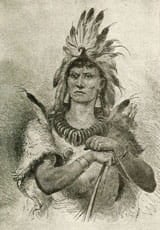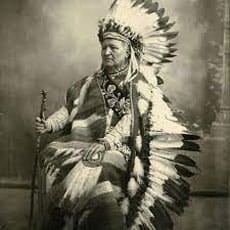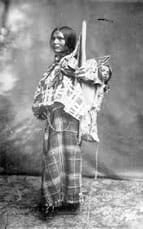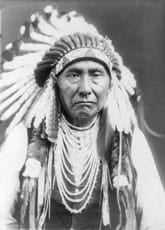While our Founding Fathers, presidents and military leaders are remembered as heroes of American culture, it's often overlooked how indigenous people contributed to many of the major events in the nation's history. It’s important we celebrate all of the incredible humans who had an impact on American culture. Here are five Native Americans who left a lasting mark with their leadership, bravery and innovations:

Powhatan
Also known by his proper name of Wahunsenacawh, Powhatan is perhaps best remembered as being the father of Pocahontas. Pocahontas was a woman known for her role in the English colonial settlement at Jamestown, Virginia in the early 1600s. He was also a massively powerful chief at the time. His authority extended to over 30 tribes and about 15,000 Algonquian-speaking people of the coastal Virginia area. Powhatan had a mixed relationship with the newcomers. His early assistance gave way to open warfare as they battled for control over the territory, though their relations were largely peaceful by the time of his death in 1618.

Sequoyah
A silversmith and artist who was also known as George Gist or Guess, Sequoyah made his greatest contribution to indigenous culture with his formation of the Cherokee syllabary. His work, reportedly fine-tuned over the course of 12 years, produced a collection of 85 symbols to match the sounds of his traditional language. However, it caught on at a greater speed after its formal adoption by the Cherokee Nation. His syllabary remains in use today, while his name lives on through the ancient trees that tower over the Northwest.

Sacagawea
A Lemhi Shoshone Native American who was abducted by an enemy tribe and found herself married to a French Canadian trapper, Sacagawea stepped into the limelight when she joined the Lewis and Clark expedition, baby boy in tow, in April 1805. Along with serving as a translator for negotiations with the Shoshones, the teenage mother contributed to the mission's success with her knowledge of vegetation and geographical checkpoints, enduring illness and the elements until returning to her South Dakota home in August 1806. Sacagawea soon slipped back into the shadows and died less than a decade later, though another version holds that she rejoined her people and lived to be nearly 100 years old.

Chief Joseph
In contrast with his peers who became famous for defending their lands, Chief Joseph is remembered for a courageous effort to lead his Nez Perce Native Americans out of harm's way. The retreat came after years of resisting attempts to relocate to a small Idaho reservation. They nearly made it to safety in Canada amid the pressure applied by 2,000 U.S. troops, until Joseph delivered a memorable speech of surrender in October 1877. Although the "Red Napoleon" earned the respect of American military leaders, his hope of being allowed to return to the Northwest never came to fruition.

Wilma Mankiller
The narrative of the Native American quest for survival continues past the forced relocations and bloodshed of the 19th century. Its later chapters are filled with stories like Wilma Mankiller’s. She was named the first female chief of the Cherokee Nation in 1985. Mankiller led various health and education initiatives and is credited with boosting tribal membership and revenues by nearly 200 percent during her 10 years in charge. She also helped establish the federal Office of Tribal Justice, authored two books and taught at Dartmouth College. Her lifelong commitment to activism was rewarded with the Presidential Medal of Freedom in 1998.
Native Americans have a complex and rich cultural legacy that dates back thousands of years. They have made major contributions to American history, culture, and society, but their tales and accomplishments are sometimes forgotten or undervalued. Ever since European settlers began arriving in the 16th century, leadership for America’s Indigenous peoples has largely involved fighting to simply exist. It’s important we recognize their contributions, not just during Native American Heritage Month, but always.
Happy Native American Heritage Month!





Leave a Comment